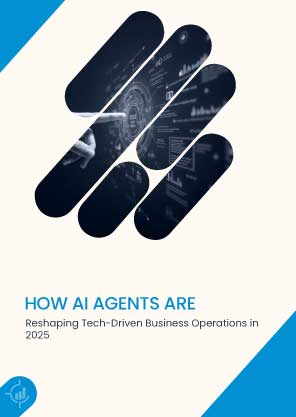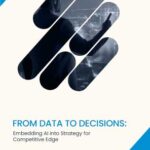or call: +1 (845) 347-8894

or call: +1 (845) 347-8894

In 2025, companies are collaborating with a new type of assistant: AI agents. They are not merely chatbots or basic software. They are intelligent systems that are capable of learning, planning, and getting work done between departments, without requiring someone to direct them at every turn.
According to a recent McKinsey research, organizations that use AI agents complete jobs 40% faster and reduce operational errors. These are now in charge of finance, IT, human resources, and customer support, making operations more efficient and precise. In this article, we’ll look at what AI agents are, how they’re changing the way businesses operate, where they’re already having an impact, and what leaders should know before bringing them in.
AI agents are intelligent, goal-driven systems that are able to make independent decisions, execute multi-step processes, and continually learn from context and feedback. Not only do AI agents differ from legacy bots or fixed automations, but they are dynamic digital actors. They don’t simply respond to commands; they perceive, reason, and act intentionally throughout enterprise processes. In 2025, these agents are not laboratory experiments; they are live. Their capacity to respond in real time to shifting inputs, business rules, or customer requirements makes them essential for companies competing in a high-velocity digital environment.
AI agents are no longer only IT helpdesks or customer service chatbots. By 2025, they are highly embedded across functions: finance, supply chain, HR, procurement, and marketing. These agents are integrated with CRMs such as Salesforce, cloud ERPs such as Oracle or SAP, and even endpoint management software.
For example, in finance processes, they may analyze cash flows, send out planned notifications for vendor delays, and initiate approval chains without the involvement of humans. In human resources, they can automate onboarding by verifying documents, provisioning access credentials, and customizing welcome experiences.
Firms such as ServiceNow and Microsoft are aggressively developing enterprise-class AI agents that act as copilots to business decision-making. Such agents do not replace teams but enhance them by removing low-value, repetitive decisions, thus fueling more strategic output.
The 2020s witnessed businesses going for automation, mainly in the form of Robotic Process Automation (RPA). But RPA is brittle. It responds beautifully when processes are linear and data inputs are predictable. What if a new regulation alters workflow logic? Or if a customer query does not fit a predetermined pattern? That is where AI agents shine.
While RPAs simply execute scripts, AI agents learn. They can parse unstructured data, comprehend objectives, and develop over time through experience. A Tier-1 telco replaced its entire escalation process, for example, with an AI agent that would examine sentiment, review network logs, and re-prioritize cases according to risk drivers—something a rules-based bot just couldn’t manage.
AI agents can make decisions without the need for human consultation. They rely on contextual awareness and working policies to act autonomously while remaining compliant with enterprise governance.
Whether interpreting customer support tickets or voice calls, AI agents in 2025 possess robust NLU to interpret complex language, recognize sentiment, and comprehend business jargon.
These agents can sequence things: pick up a service ticket, verify inventory, call suppliers, arrange logistics, and alert the customer—all on their own.
In contrast to hard-wired automations, they learn continuously from signals of success or failure and modify their patterns of reasoning over time.
Vendors are integrating security layers into agent processes: from role-based access control through to audit trails and compliance tagging, agents are built to work in regulated environments.
Customer Service: AI agents are handling Tier-1 as well as Tier-2 support. They extend beyond responding to FAQs by conversing with backend systems, changing passwords, altering user accounts, and alerting to policy violations.
IT Operations: Agents read logs, identify anomalies, and automatically resolve incidents. In 2025, various Fortune 500 companies are leveraging AI agents as independent site reliability engineers (SREs) for cloud infrastructure.
Sales and Marketing: AI agents qualify leads, compose customized outreach emails, and even recommend next-best actions for sales forces. They are tightly integrated into CRMs and campaign platforms.
Finance and Compliance: Transactions are reconciled in real time, invoices are authenticated, and fraud is identified via behavioral patterns. JPMorgan’s AI agent allegedly reduced manual compliance effort by 35% in 2024.
Procurement: Autonomous agents procure alternative suppliers, examine price trends, and negotiate contracts with little intervention, accelerating the procurement lifecycle.
Notwithstanding their advantages, AI agents are accompanied by deployment issues. Integration with legacy infrastructure continues to be a stumbling block. Governance is also a challenge someone has to audit agent decisions. What happens if an agent behaves outside its specified policy?
Another issue is ethical risk. Agents trained on skewed data can repeat discriminatory actions. Tech executives must ensure that agent behavior aligns with firm values, compliance requirements, and customer confidence. Change management is also important. Workers can fear being replaced or be confused about the agent’s purpose. Open communication and upskilling are essential for seamless adoption.
Installing AI agents is more than a technical challenge. It requires cross-functional leadership by IT, legal, compliance, security, and business teams. It takes AI operations managers, rapid engineers, data privacy leads, and human-AI interaction designers. A dedicated AI governance board is becoming standard in 2025 to oversee how agents are trained, monitored, and improved over time.
AI agents aren’t replacing people; rather, they’re redefining how we work. By managing operational load, they allow people to devote more time to strategy, creativity, and governance. A Forrester 2025 study discovered that 68% of businesses using AI agents indicated increased employee satisfaction through lowered cognitive fatigue.
Roles such as “AI Behavior Auditor” and “Autonomous Workflow Architect” are starting to appear, marking a change in enterprise job creation. This shift parallels the emergence of cloud engineers ten years ago—once niche, now central.
Step 1: Identify High-Friction Workflows – Start where business value is most self-evident: high-volume, low-complexity workflows. Prioritize functions with measurable outcomes.
Step 2: Pilot with Guardrails – Test pilots in siloed environments with clearly defined KPIs. Ensure adequate ethical and operating controls.
Step 3: Scale Through Feedback and Governance – Gradually scale once validated. Continuously train agents, measure outcomes, and maintain human-in-the-loop mechanisms in place.
AI agents are not future ideas; they are here and transforming operations in industries. To companies that adopt them strategically, the payoff is not merely efficiency but competitive advantage. It will be mandatory to invest in the right infrastructure, people, and governance today because by 2025, smart agents will no longer be discretionary. They’re up and running, and they’re game-changers.
An AI agent is a self-operating digital system that executes tasks, makes decisions, and learns from live data to streamline workflows across business operations such as IT, finance, HR, and customer support.
Unlike rule-based RPA or scripted chatbots, they learn and adapt to context, process unstructured information, and grow through ongoing learning, which makes them a better fit for dynamic enterprise environments.
Those with intricate operations in finance, telecom, logistics, and healthcare gain the most. They minimize manual labor burdens, increase compliance, and scale efficiency.
Yes, enterprise-class agents are built with role-based access, audit trails, encryption, and compliance tagging to accommodate industry regulations such as GDPR, HIPAA, and SOX.
Start by defining high-friction, repetitive work. Pilot AI agents with quantifiable KPIs and scale up in a controlled manner with good governance and cross-functional cooperation.
To participate in our interviews, please write to our IntentTech Media Room at sudipto@intentamplify.com




